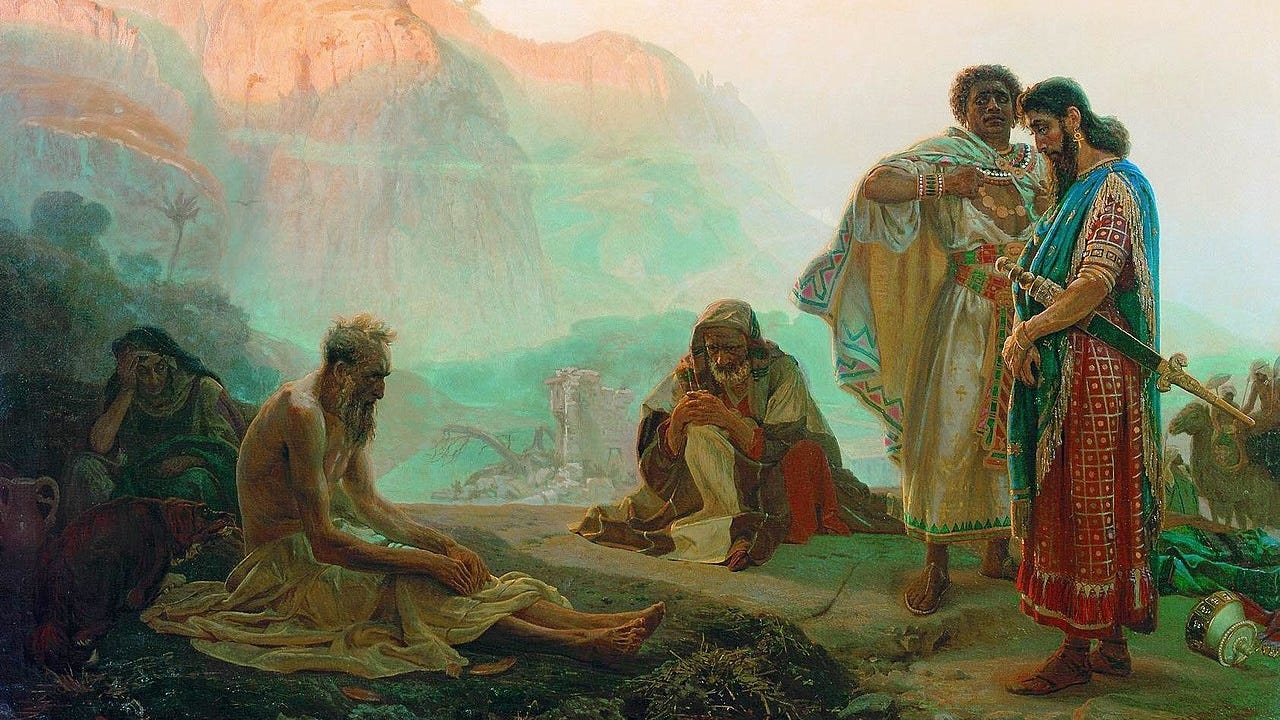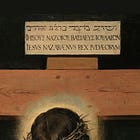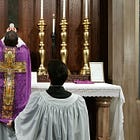Absolute degradation—the state of the world before Christ
Two key reasons why God waited so long to redeem mankind.

Two key reasons why God waited so long to redeem mankind.
This is a three-part Advent series on the state of the world before Christ, from Father Henry James Coleridge’s Preparation of the Incarnation
In this first section, Fr Coleridge talks about the progressive degradation of the world after the fall of Man, and explains why God waited for so many centuries to redeem mankind through the incarnation of Our Lord Jesus Christ.
In the Advent Ember Week, focused on prophecies of Christ’s coming, this is very important reading.
Here are the other two parts:
Absolute Degradation—The state of the world before Christ
From
The Preparation of the Incarnation
Fr Henry James Coleridge, 1885, Ch. 1, pp 1-12
The fulness of time
“When the fulness of the time was come,” says St. Paul to the Galatians, “God sent His Son, made of a woman, made under the law, that He might redeem those who were under the law, that we might receive the adoption of sons.”1 The same Apostle writes to the Ephesians of “the mystery of His will, according to His good pleasure which He hath purposed in Him, in the dispensation of the fulness of times, to re-establish all things in Christ, that are in heaven and on earth.”2
We gather from these and other similar expressions which are to be found in the Sacred Scriptures, that the eternal counsel of the ineffable mercy of God, for the salvation of mankind, and for the restoration thereby of the ruin which had been caused in heaven by the fall of the rebel Angels, was carried out, in the Incarnation, at a definite and fixed moment in the history of Creation.
This moment had been chosen by God from the beginning. It was the central point of His Providence in the government of the world. To this moment all things that had passed before gradually led up, and from it the whole course of subsequent events was to take its character and colour. After this point of time, the whole history of the human race is the history of the consequences of the Incarnation, and before that point of time the whole of the same history is the history of the preparation for the Incarnation.
That one point is the fulness of the time, spoken of by the Apostle, a point of time more marvellous in its pregnant fertility than the moment of Creation itself, a point on which the issues of the great day of account, which is to close the history of the world, themselves depend. Thus it is a point, the fruitfulness of which will never be exhausted, as long as that newly established order of things lasts in the eternity of heaven, which St. Paul speaks of as the reconciliation and recapitulation of all things in Christ. It is the beginning of the new Creation which lasts for ever.
What is meant by it?
It is natural that, on entering on the consideration of the execution of this great counsel of God, the Christian mind should pause to enquire what it can learn from the study of His ways, as they are disclosed to us by this dispensation of His Providence, concerning the attributes and character of Him, “Who reacheth from end to end mightily and disposeth all things sweetly.”
What is meant by the fulness of time? Was the moment arbitrarily chosen, when other moments might have served equally well the Divine purpose? How is the wisdom of God shown in the fact that the Incarnation did not come about before and was not longer delayed? Why was the world left so long without it, and why, when it was once come about, was the world to last so long after it? What was there in the state of the human race and in the unfolding of the counsels of God towards it, which made that certain moment in the Empire of Augustus the chosen time for the healing of earth and for the reparation of the losses of heaven?
It is possible to press these questions too freely, and it is possible to pass them over too indolently. Though their full solution must be reserved for the time when our knowledge of God and of His ways shall be made perfect, we may profitably gather from the theologians of the Church something at least concerning such questions that may add to our intelligence, quicken our faith, and increase our gratitude.
St Peter’s maxim
It would seem as if we could not better begin our considerations of this great subject than by reminding ourselves of the truth which is insisted upon by the Apostle St. Peter in his second epistle, where he is speaking of the somewhat kindred matter of the long delay, as it appeared to some of his time, in the accomplishment of the prophecies of the ending of the world. St. Peter bids those to whom he writes remember this one great truth, that a single day is to God as a thousand years, and a thousand years as a single day. He speaks of the delay of the last day as an exercise of the patience of God. “The Lord delayeth not His promise, as some imagine, but dealeth patiently with you, for your sakes, not willing that any should perish, but that all should come to penitence.”3 We may surely suppose that some such great purpose of love and patience, in waiting for the moment when the world would be most fit to receive the great mercy of the Incarnation, was the Divine reason for the gradual and leisurely unfolding to mankind of this great counsel for its redemption. The lapse or duration of time is nothing to the Eternal One. But the beings of a day, when dealt with by Him, must be the objects, first of all, of infinite patience.
What has been gained by delay
Let us look back over the centuries which have passed since St. Peter wrote these words of warning. How much do we see there of glory to God, how much of manifestation of His great attributes, of the powers with which He has endowed His Church, even externally to her own kingdom, in the healing of the world and the increase of human happiness and knowledge, and much more internally, in the display of sanctity, in the illustration of the character of our Lord as reflected in His saints, in the power of the cross, in the unfolding of the treasures of Christian truth under the conflict with heresies!
Yet all this might have been missed, if the end of the world had come in the days of Nero. The longer the world lasts, the more do we see of the wonders of the Providence of God, of the powers of the grace of our Lord, of the inherent vitality of the Church, of the beauties and the prerogatives of the saints.
We can see that the drama of the life of the Church in the world is one arranged by the most marvellous wisdom, and that nothing happens which God cannot turn to good, while He is displaying all the time His faithfulness to the promise which He made to St. Peter on the day of his great confession of faith at Caesarea Philippi, and above all, His infinite patience in bearing with the perverseness of men.
Fruits of the Incarnation available from the first
But the eyes of man are feeble indeed in the reading of the secrets of the counsels of God, and the whole life of the Church will never be seen in all its Divine beauty, until it can be studied in the light of Heaven. Indeed, all is already studied there, by the mighty intelligence of the Angels, who learn, as St. Paul tells us, from the history of the Church the manifold wisdom of God.
In the same way, the Angels have been gazing, ever since the creation, on the beauty of His work in the unfolding of His plan of redemption. But men, such as ourselves, cannot hope to be able to interpret the marvellous and most patient wisdom by which the execution of the Incarnation was heralded and prepared for so long before it was actually accomplished.
We start from the knowledge that there never was a time in the history of our race when the fruits of the Incarnation, however distant in the future was its execution, could not be reaped by those faithful souls who used rightly the light which they possessed, and followed the law of God as far as it was manifest to their conscience. St. John speaks of our Lord, in the Apocalypse, as “the Lamb slain from the beginning of the world,”4 and the truth which is thus hinted at by the Apostle is enough to show us that mankind were never from the first moment of the Fall abandoned by their Maker, but that, on the contrary, there was from the beginning a provision, far more abundant perhaps than our ordinary thoughts comprehend, for the application to the souls of men of the merits and efficacy of the Precious Blood which was to be shed on the Cross.
Provision made for all men
In this sense the Incarnation was accomplished from the very beginning in the counsels of God, and in its fruit for the salvation of the human race. Mankind started on their way with the promise which is commonly called the ‘first Gospel,’ in which they could recognise the distinct prediction of the Virgin Mother and her Divine Child, Who was to triumph over Satan and all his brood.
Faith, the necessary condition for acceptance with God, was thus made possible, its object was set forth as the future Redeemer, Who was to be the seed of the Woman and to crush the head of the serpent. This promise included the remission of sins, and it might be laid hold of by faith, which was manifested and exercised by some simple acts of worship, prayer, and especially sacrifice.
Those who rightly availed themselves of these means of grace were in no essential point cut off, as it were, from having a part in the Incarnation. Their part in it was as practical as if they had lived in the full blaze of the Gospel dispensation. This provision for man could never be revoked by subsequent and further revelations, although those to whom such further revelations were made were bound to receive them with the same faith. Those who had no such further promises had in this enough for their salvation.
The history of Job
The Sacred Scriptures themselves contain a clear witness to this truth in the history of Job. There is no mark in that beautiful book of any more formal system of religion than that which might have been founded on this original promise, aided, of course, by the traditions of the law of God which were the common property, first of the children of Adam and Seth, and then of the descendants of Noe.
It is of comparatively little importance at what epoch in the history of the world the actual person whose history is here recorded may have lived. It is not even necessary, for the argument before us, that the book should be considered other than as a kind of drama founded upon his history. What is certain is that the book of Job gives us a perfect picture of the religious state of those who served God faithfully, possibly outside the Covenant which was made with Abraham, at least without any knowledge of the Mosaic legislation.
We see the light and the grace of the Kingdom of the Incarnation in every verse of this glorious poem. Job lived and died in the faith of the future Redemption, and what he did, others also could do. We see in him how men could do what St. Paul reproaches the heathen for not doing, that is, use the visible creation as a book to teach them about God. We see how they could keep the law of purity, of justice, of mercy, of charity, and keep their hearts ever open to the light of His all-seeing Eye, walking before Him, and so being perfect. Neither grace for holiness, nor remission for sin, nor hope for the future, were beyond their reach.
But for the depravity of man, the machinations of the spiritual enemies of our race, and the consequent extinction, to so large an extent, even of the natural law, under the polytheism and idolatry which darkened the whole world, it might have seemed that God might have left it without further provision by way of preparation for the crowning mercy of Redemption.
Reasons given by the fathers for the delay of the Incarnation
If it be the case that the graces of which the Incarnation was to be the source were to be so largely gained, as it is evident from this portion of Sacred Scripture, before those further steps in the preparation for that great mercy, which followed on the failure of men in general to live up to the light of the primitive revelation, it is clear that there was no essential necessity for the hastening on of those further steps, if it was more in accordance with the Providence of God that the process of preparation should be very gradual.
One of the reasons given by the Christian Fathers for the delay of the Incarnation is contained in the principle that man was so to be redeemed and delivered from his bondage, that he might have learnt first from his humiliation how much need he had of One Who might redeem and deliver him. Another statement that is found in the same writers is that the grace was delayed for the reason that, when a very great personage is to come as judge, a very long train of heralds and forerunners is sent before his face.
If we examine these two statements, we find that there may be two reasons practically assigned for the lengthening out of the preparation for the Incarnation. One of these is based on the dignity of the coming Deliverer. Certainly this must include also the greatness of the work which He was to do, and of the system which He was to leave behind Him. The other reason rests on the fitness of preparing mankind for so great a blessing, by making them feel beforehand their immense need thereof. There are very pregnant and fertile thoughts contained in these brief statements, and it would not be easy to exhaust their significance.
The Incarnation prepared for in two ways
When we look at the history of the world before the coming of our Lord, we may seem to see the combined and simultaneous operation of both these principles. The Christian dispensation is founded on the dispensations which precede it, the Primitive, the Patriarchal, and the Mosaic.
In each of these the graces of the coming Kingdom might be anticipated. In each of these successively, the lineaments of the future dispensation, which was to be final and complete, are more and more clearly defined as time proceeds.
In each of these, by the side of great boons and graces, there is a perpetual cry of the human race for something more perfect and more radical in its powers of healing.
Thus the successive dispensations served to prepare for the final blessing in two ways, by foreshadowing it, and by making men feel more and more its necessity. But for this, a considerable series of generations was required. Such a work could not be done in a moment.
Original condition of man as to knowledge of God
If we suppose mankind to have been engaged in an unequal conflict with the power of evil, that they might learn their own weakness, and be driven by that knowledge to have recourse to God, we must allow some lapse of time for the permission, in His long-suffering patience, of that utter decay of the primitive traditions of mankind which is to be seen in the heathen world at the time of the coming of our Lord.
Man began with an immense amount of knowledge, both of himself, and of God, and of the future, and of the world in which he was placed. He began with the law written in his heart, with the supremacy of conscience acknowledged, if it was often rebelled against. He began with the worship of the One God, and with a facility of rising to Him by means of the natural Creation which is forgotten in times of refinement and artificiality of life.
It was easy for him to preserve the primitive traditions of Paradise and of the promised Redeemer, when human life was so prolonged that a score of successive generations might be alive at the same time. We do not know that idolatry and the worship of false gods existed before the Flood. The process of corruption was rapid enough. But it is chiefly traced, in the Scriptural accounts, to the enormous sensuality natural when life was so luxurious and so free from external dangers.
Alas! it took but comparatively few centuries for the enormous growth of heathen idolatry, with its deification of all the worst lusts of human corruption, its consecrated pollutions and diabolical impostures, to take possession of the heathen world.
But we must not forget that the onward sweep of this victory of evil was not unresisted. Each generation of man, every individual of each generation, had a fight to wage of his own, and many a single soldier in that tremendous conflict may have won the crown of faithfulness to his light, even though the line in which he fought was continually driven back.
Depth and multifariousness of human degradation
How few words does it take to speak of this intense corruption and degradation of Humanity, a degradation and a corruption which are still in full force and possession in large portions of the world!
Learned men have laboured in tracing out the details of the various false religions which have grown up in the place of the truth with which man originally started from Paradise. The investigation might be made almost as endless as the study of nature itself. But the deeper we penetrate in the study of nature, the more multiplied do we find the proofs of God’s wisdom and goodness.
The further we go in unveiling the systems of falsehood and corruption, the more we are overwhelmed by the intolerable loathsomeness of these imaginations of man and of his spiritual enemies.
The false religions and their character
Everywhere we find the same result, from whatever false principle the process may have started. Whether it begins from the worship of natural powers, or from the deification of the departed, or the distribution of the Divinity among various persons, according to its relations with man, or from the dualistic principle, which is suggested by the conflict between good and evil in him, or any other fruitful invention of evil, it is always the obscuration of the true idea of God, it is always the degradation of all that resembles God in man, and the elevation and tyranny of all in him that is like the lower animals or like the fiends themselves.
Every false religion implies the denial of the Holiness, or the Justice, or the Benevolence, or the Mercy, or the Providence of the Divinity. God, or the gods, become envious and jealous of the prosperity of men, or they are terrible and inexorable, or they lower themselves to the level of men, or even outdo them, in sensuality and impurity, or they require the sacrifice of virtue or of life itself as the conditions by which alone they can be propitiated.
Cruelty, lust, murder, rebellion against parents, unfaithfulness to the conjugal tie, and to the parental and filial duties, theft, deceit, seduction, and unnatural crimes, were placed on the altars of the heathen world. The whole system of worship was a system of debauchery, and in some cases the most profligate extremes of licentiousness could best be found in the temples and among the priests and priestesses of the popular worship.
There are many forms of polytheism and heathenism. Some are gloomier than others, some brighter and more simply sensual. Some are bloodier, as where human sacrifices were required, others have fewer rites and less elaborate ceremonials. The difference comes, it may be supposed, from the character of the people, its history, the portion of the world in which it settled, the climate, and other circumstances of the same kind.
But there is unity in all this diversity, the unity of the malignant purpose of the evil powers, greater than man, who were concerned in this hideous fabrication of false religions. The unity is the unity of hatred of God, of insane pride and vanity, shown in the desire of getting themselves worshipped in His place, of hatred also to men, of hatred of all that is innocent and good, and virtuous, and gentle, and merciful, of all that can make life noble and happy, of the practice of morality, of the service of God, according to the law of conscience, of the faithful preservation of the original traditions and the original hopes of the race.
Read Next:
From Fr Henry James Coleridge, The Preparation of the Incarnation
Here’s why you should subscribe to The Father Coleridge Reader:
Coleridge provides solid explanations of the entirety of the Gospel
His work is full of doctrine and piety, and is highly credible
He gives a clear trajectory of the life of Christ and all its stages.
If more Catholics knew about works like Fr Coleridge’s, then other works based on sentimentality or dubious private revelations would be less attractive.
Sourcing and curating the texts, cleaning up scans, and editing them for online reading is a labour of love, and takes a lot of time.
Will you lend us a hand and hit subscribe?
Read next:
Follow our projects on Twitter, YouTube and Telegram:
Gal. iv. 3
Eph. i. 9.
2 Peter iii. 8, 9.
Apoc. xiii. 8.








